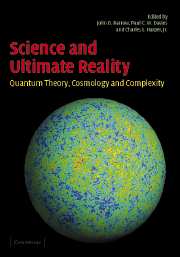Book contents
- Frontmatter
- Contents
- List of contributors
- Foreword
- Editors' preface
- Preface
- Acknowledgments
- Part I An overview of the contributions of John Archibald Wheeler
- Part II An historian's tribute to John Archibald Wheeler and scientific speculation through the ages
- Part III Quantum reality: theory
- Part IV Quantum reality: experiment
- Part V Big questions in cosmology
- Part VI Emergence, life, and related topics
- 26 Emergence: us from it
- 27 True complexity and its associated ontology
- 28 The three origins: cosmos, life, and mind
- 29 Autonomous agents
- 30 To see a world in a grain of sand
- Appendix A Science and Ultimate Reality Program Committees
- Appendix B Young Researchers Competition in honor of John Archibald Wheeler for physics graduate students, postdoctoral fellows, and young faculty
- Index
28 - The three origins: cosmos, life, and mind
from Part VI - Emergence, life, and related topics
Published online by Cambridge University Press: 29 March 2011
- Frontmatter
- Contents
- List of contributors
- Foreword
- Editors' preface
- Preface
- Acknowledgments
- Part I An overview of the contributions of John Archibald Wheeler
- Part II An historian's tribute to John Archibald Wheeler and scientific speculation through the ages
- Part III Quantum reality: theory
- Part IV Quantum reality: experiment
- Part V Big questions in cosmology
- Part VI Emergence, life, and related topics
- 26 Emergence: us from it
- 27 True complexity and its associated ontology
- 28 The three origins: cosmos, life, and mind
- 29 Autonomous agents
- 30 To see a world in a grain of sand
- Appendix A Science and Ultimate Reality Program Committees
- Appendix B Young Researchers Competition in honor of John Archibald Wheeler for physics graduate students, postdoctoral fellows, and young faculty
- Index
Summary
The three origins: how come us?
We cannot but wonder about our origin. Cultures throughout history have created mythical narratives that attempt to answer this most vexing of questions, “Why is there something rather than nothing?” Hard questions inspire further thought, and the harder they are, the more inspiring they can be. The rich variety of creation myths is testimony to this. Most of the myths bypass the issue of “something from nothing” by eliminating the nothing: an absolute reality, in the form of a deity or deities, exists outside space and time and originates the cosmos, the order of material things. Creation involves the transition from the absolute to the relative, from a spaceless and timeless reality to a reality within space and time. Myths that don't invoke a deity presume some form of absolute reality which encompasses all opposites, order and chaos, light and darkness. The cosmos emerges spontaneously out of the tension between the opposites, and differentiation follows. A curious exception comes from the Maori people of New Zealand, who describe the origin of all things as coming from nothing, without the action of a god: the cosmos simply comes into being out of a universal urge to exist, a sort of irresistible impulse of creation (Gleiser 1997).
A more detailed study of creation myths shows that they describe the origin of the cosmos through two distinct uses of the concept of emergence: driven emergence and spontaneous emergence.
- Type
- Chapter
- Information
- Science and Ultimate RealityQuantum Theory, Cosmology, and Complexity, pp. 637 - 653Publisher: Cambridge University PressPrint publication year: 2004
- 4
- Cited by



